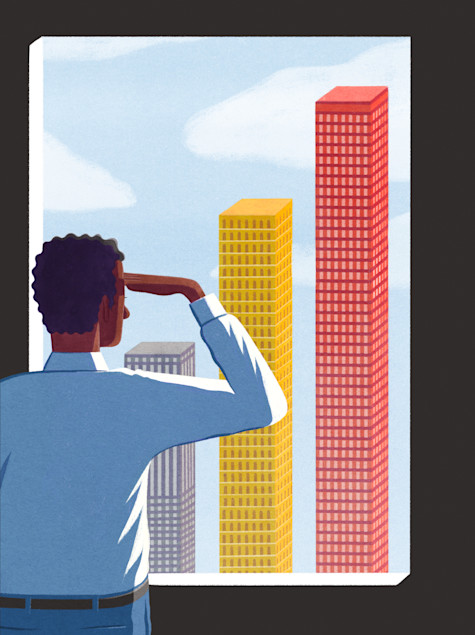How Should Investors React to the Coronavirus?

It is now clear that the coronavirus has escaped the attempted containment by Chinese authorities and has spread around the world. According to the World Health Organization, there are 79,331 confirmed cases, of which 77,262 are in China and 2,069 are outside of China (as of February 24, 2020). The two largest country clusters are in South Korea (with 232) and Italy (with 64). And many of those numbers seem to be on the rise, with the Washington Post reporting on February 24 that there were 833 confirmed cases in South Korea and 53 confirmed cases in the U.S.
Market Reaction
On Monday, global financial markets were down by 3 percent or more. Here in the U.S., they were down by almost 5 percent from their peaks. This drop is one of the largest in recent months, and it reflects the sudden apparent surge in cases over the weekend. Investors are clearly expecting more bad news—and rather than wait for it, they are selling.
Is selling the right thing to do? Probably not. Indeed, the virus could continue to spread and even get worse. But we do know a couple of things.
What We Know
First, new cases in China seem to be leveling off, having peaked between January 23 and February 2. We can expect things to get worse in countries with new outbreaks, but steps can be taken to help control the virus—as has been shown in the origin country.
Second, countries have been applying the lessons learned from China to their own outbreaks, which should help contain their outbreaks. For example, the Centers for Disease Control and Prevention (CDC) reports 14 cases diagnosed in the U.S., as well as 39 cases in people repatriated here from China or the Diamond Princess cruise ship. Cases here appear well contained and under surveillance, which should help limit any spread. The same holds true in most of the developed countries.
For all the hype, then, in many countries and certainly in the U.S., the coronavirus remains a very minor risk. Another way to put that risk in context is that during the current influenza season, there have been 15 million cases, 140,000 hospitalizations, and 8,200 deaths. Compared with the average flu season, then, the coronavirus does not even register. With 53 current coronavirus cases, it could certainly get worse. At least in the U.S., however, the overall damage is not likely to come close to what we already accept as “normal.”
Assessing the Investment Risk
While the risk to your health may be small, that may not be the case for your investments. The epidemic has already caused real economic damage in China, and it is likely to keep doing so for at least the first half of the year. The same case seems likely for South Korea. These two countries are key manufacturing hubs. Any slowdown there could easily migrate to other countries through component shortages, crippling supply chains around the world. Again, there are signs in the electronics and auto industries that the slowdown is already happening, which will be a drag on growth. This risk is largely behind the recent pullback in global markets.
Here, the key will be whether the disease is contained—which would still be a shock to the system but would be normalized fairly quickly—or whether it continues to spread. Right now, based on Chinese data, the first scenario looks more likely. If so, Chinese production should recover in the next six months, with the economic effects passing even more quickly. It might help to think of this situation like a hurricane, where there is significant damage that passes quickly. Stock markets, which typically react quickly on the downside, can bounce back equally quickly. Should the virus be contained, it would be a mistake to react to the current headlines. We have seen this situation before—the drop and bounce back—with other recent geopolitical events.
What If the Virus Continues to Spread?
Even if the virus continues to spread around the world, those in the U.S. should take a deep breath. The U.S. economy and stock markets are among the least exposed to the rest of the world, and they are the best positioned to ride out any storm. Further, the U.S. health care system is among the best in the world, and the CDC is the top health protection agency in the world. As such, we are and should be relatively well protected. Finally, given that the U.S. economy and markets depend primarily on U.S. workers and their spending, we are less vulnerable to an epidemic. We should do relatively well, as has happened in the past.
The Proper Course
The headlines are scary and Monday’s market declines even more so. But the economic foundation remains reasonably solid around the world. The epidemic is a shock, but it is not likely to derail the recovery. The World Health Organization, while recognizing the risks, has not declared a pandemic, indicating that the risks remain contained. The U.S. is well positioned, both for the virus and for the economic effects.
We certainly need to pay attention. But as of now, watchful waiting continues to be the proper course. Once again, remain calm and carry on.
Editor’s Note: The original version of this article appeared on the Independent Market Observer.
The information on this website is intended for informational/educational purposes only and should not be construed as investment advice, a solicitation, or a recommendation to buy or sell any security or investment product. Please contact your financial professional for more information specific to your situation.
Certain sections of this commentary contain forward-looking statements that are based on our reasonable expectations, estimates, projections, and assumptions. Forward-looking statements are not guarantees of future performance and involve certain risks and uncertainties, which are difficult to predict. Past performance is not indicative of future results. Diversification does not assure a profit or protect against loss in declining markets.
The S&P 500 Index is a broad-based measurement of changes in stock market conditions based on the average performance of 500 widely held common stocks. All indices are unmanaged and investors cannot invest directly into an index.
The MSCI EAFE (Europe, Australasia, Far East) Index is a free float‐adjusted market capitalization index that is designed to measure the equity market performance of developed markets, excluding the U.S. and Canada. The MSCI EAFE Index consists of 21 developed market country indices.
Third-party links are provided to you as a courtesy. We make no representation as to the completeness or accuracy of information provided at these websites. Information on such sites, including third-party links contained within, should not be construed as an endorsement or adoption by Commonwealth of any kind. You should consult with a financial advisor regarding your specific situation.
Please review our Terms of Use.


